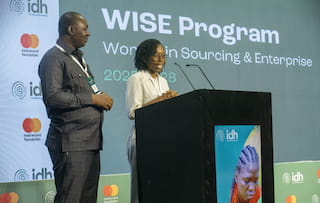Scaling local agriculture: Women, youth and SMEs at the centre

Local food systems are essential to economic growth and community wellbeing within a country. Yet, across African agri-food systems, women-led SMEs and youth entrepreneurs often operate on the margins, excluded from formal markets, underserved by financial institutions, and invisible in sourcing strategies.
Recognising this, IDH partnered with the Mastercard Foundation to establish the Women in Sourcing and Enterprise (WISE) program.
Operating in Ghana, Nigeria and South Africa, the program offers practical support, connecting small agribusinesses to financing, formal markets, and climate-smart farming techniques. By doing so, it aims to strengthen local economies and reduce dependency on imported raw materials. WISE will support nearly 400,000 young people, aged 18–35, to transition into decent and empowering work, especially young women.
The early work has already begun, and signs of systemic change becoming visible. Local SMEs are forming new partnerships and value-added activities are beginning to take root. In both Ghana and Nigeria, agriculture remains the biggest employer, yet much of the raw material for food production is still imported.
“Nigeria is a cornerstone of Africa’s economic future, driven by the strength of SMEs, the creativity of youth, and the wisdom of farmers. Through our earlier cassava initiative, we saw the power of what’s possible when local entrepreneurship meets the right kind of support. With WISE, we’re scaling that impact. From access to land and finance, to market linkages and regenerative farming practices, this is about building lasting opportunities.” Eniola Fabusoro, IDH Nigeria Director
We’re also working to industrialise and scale local agribusinesses, so African food processing companies and global FMCG firms can source more locally, sustainably, and at scale.
“The WISE program in Ghana is a bold step forward. By expanding beyond grains to include high-value horticultural crops like tomato, onion, and chilli, we’re creating year-round economic opportunities for women-led SMEs and young agripreneurs. We believe that, by investing in youth, backing women in business, and championing local sourcing, we can fundamentally shift how food is grown, traded, and valued across Ghana.” Robert Asugre, IDH Ghana Director